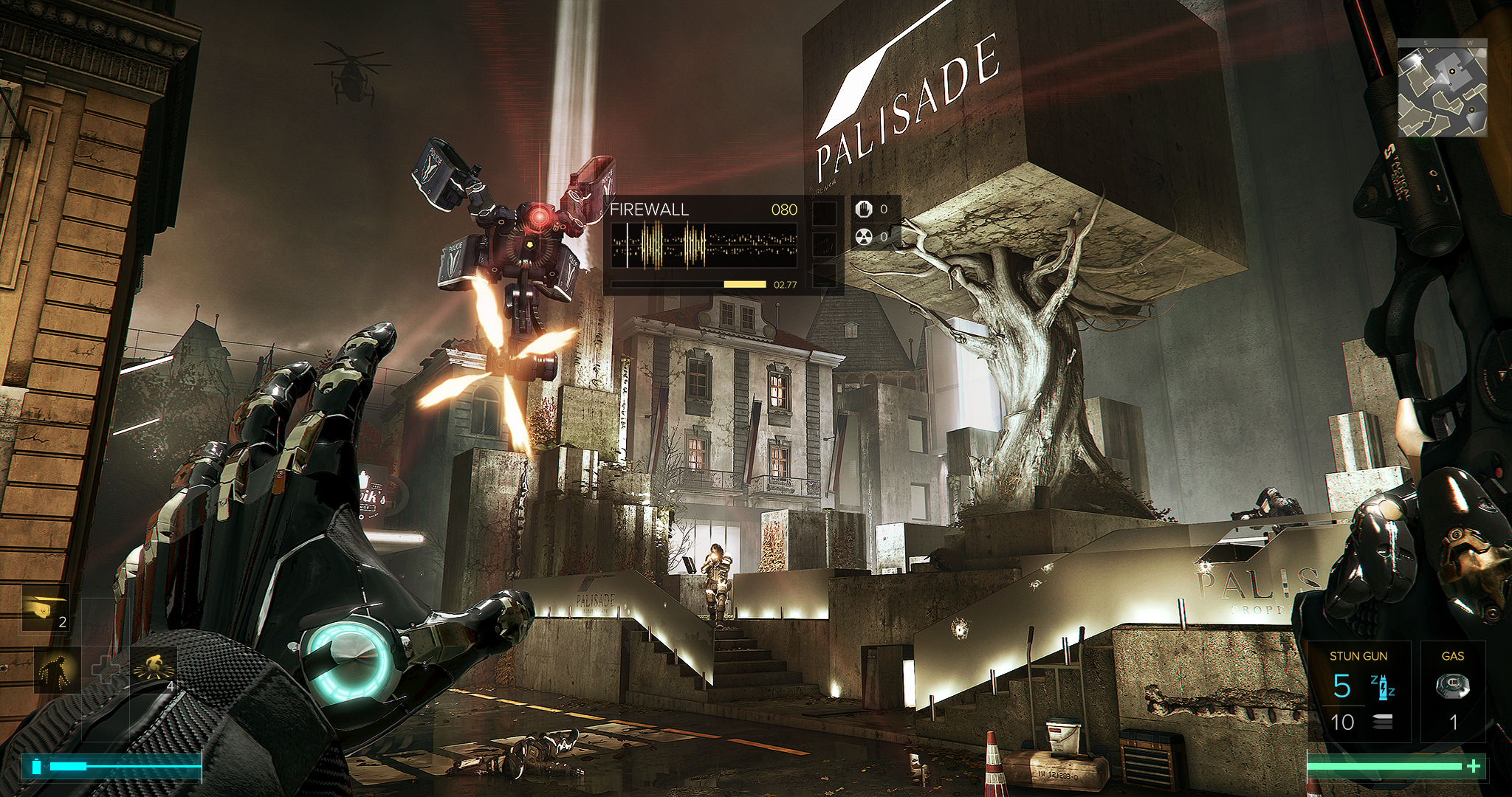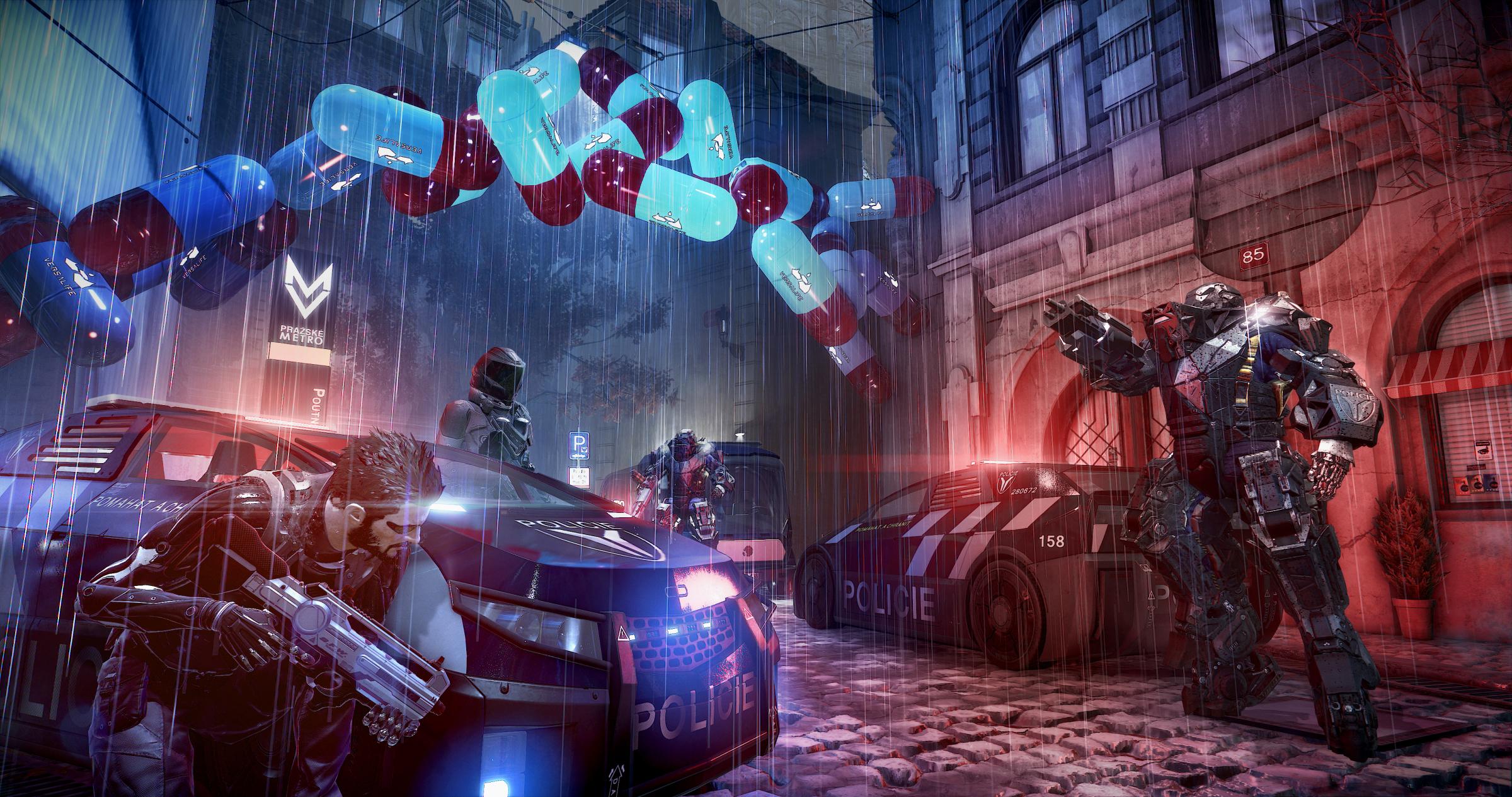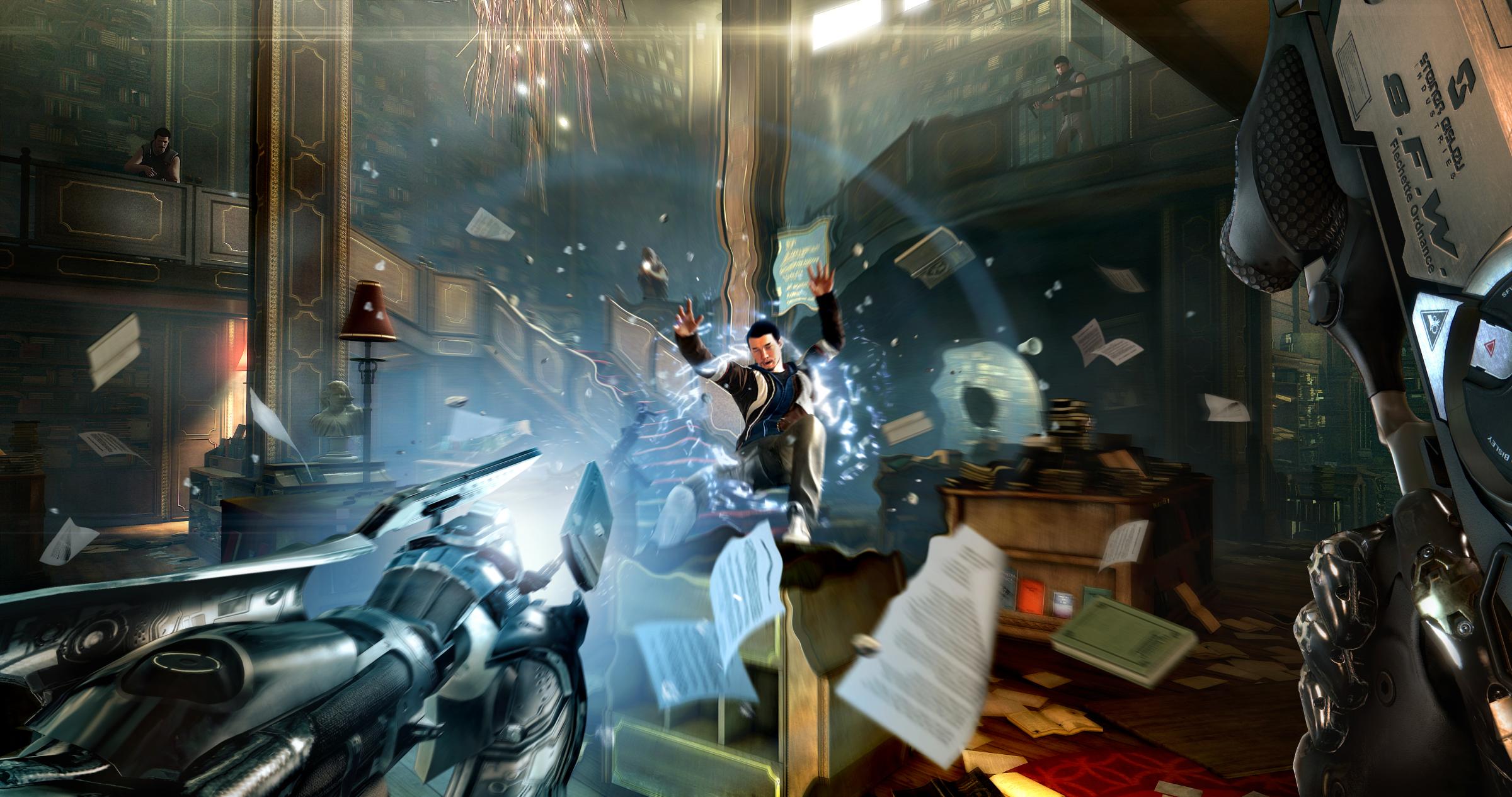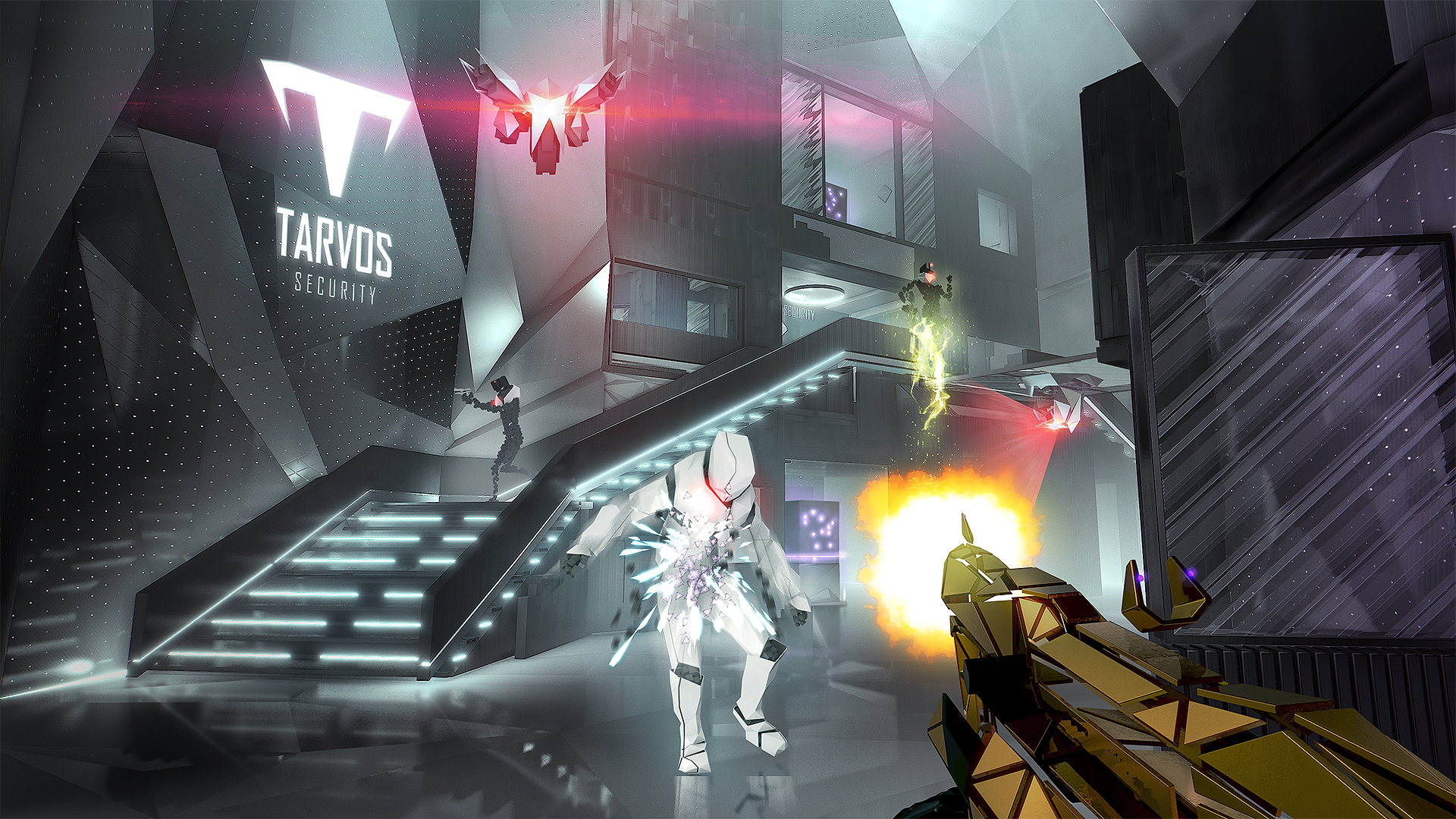It turns out Deus Ex: Mankind Divided‘s disruptive maneuver isn’t just to render me superhumanly flexible, but to slow me to a crawl. To make me want to linger over inches of screen space, trawling for painkillers, grenades, EMP bullets, and upgrades to my tweaked out wetware.
Eidos Montreal’s cyberpunk roleplaying game for PC, PlayStation 4 and Xbox One, out August 23, has its obligatory action box. And you can check it. But that’s not what’s interesting about it.
Instead of gunning down adversaries, I’m cautiously sweeping buildings, flats and back alley bric-a-brac for story flavor ebooks and digital news rags about this near-future dystopia. I’m hunting for passwords and PINs stored on strangely hip-again PDAs or carelessly dropped in emails. I need these to unlock doors and computers, to disable security cameras, gun turrets and homicidal security robots. I’m the world’s most cautious cyborg superhero, reconnoitering at a glacial pace, ghosting my way through a world of elaborate tactical puzzles with exquisite multi-path resolutions.

I’m doing so in a version of the year 2029 that’s seen humans acrimoniously divide into two camps: mechanically-enhanced citizens, or “augs,” versus “naturals” who stand opposed to transhumanist principles. You play once more as Adam Jensen, forced at the outset of the last game to become an “aug” to save your life, working for an intergovernmental anti-terrorist organization as Mankind Divided opens. During Human Revolution‘s denouement, an anti-augmented fanatic managed to drive the world’s augs into a murderous frenzy. It’s a horrific publicity stunt that informs a kind of grim “mechanical apartheid” and militaristic police rule that’s on display as this chapter opens.
Open worlds are in vogue, and so comparably cloistered ones seem suspect. But Mankind Divided reminds us that downscaling can be a kind of upscaling. Instead of the gorgeous sprawl of a Los Santos or Novigrad, you’re confined in Mankind Divided to tiny swathes of a city, like the Czech Republic’s Prague, only rendered at higher levels of detail. This is handcrafted world-building on the opposite spectral side of something like Hello Games’ algorithmically generated No Man’s Sky.
Everything feels purpose built in these cobblestone streets and crumbling baroque facades patrolled by armored cops and over-curious drones. Movable garbage bins or cardboard boxes might hide a wall vent or passageway. Hackable apartment doors conceal valuables and laptops with potentially diverting vignettes. Construction elevators lead to alt-paths along rooftops or through windows—sometimes ways of gaining surreptitious access to heavily patrolled areas. Peer closely at the parameters of an environment or scenario and you’ll often find you’ve only glimpsed their elasticity.

That you can approach each problem posed in so many distinct and satisfying ways is this series’ continued triumph. If you’re new to the Deus Ex games, but familiar with Arkane’s Dishonored, you’ll feel right at home (by way of a few centuries of forward thrust). And if you’re arriving in the know from 2011 prequel Human Revolution, you’ll find a more resonant and refined continuation of its principles—exploration, cyber-puzzling, self-augmentation, story-altering dialogue, and action or stealth approaches—bolstered by less foolish enemies, smarter storytelling and far more robust combat.
I’m relaying what it’s like to play this game from the standpoint of a sneak, and that’s still where things feel most in the zone. But if you goof, trigger a shootout and don’t care to reload, Mankind Divided feels as ballistically interesting and tactically versatile as something like Ubisoft’s The Division. Enemies will advance on your position and lay down suppressing fire to cover approaches, challenging your ability to hunker behind cover and pick them off once you’ve batted a hornet’s nest of thugs. Weapons like shotguns, rifles and pistols are more configurable and situationally distinctive, folding neatly into combat situations that demand much more prudent attention to where you’re shooting and what your enemy’s wearing and doing. Sure, it’s never as shock-and-awe as Battlefield or Call of Duty, which is also the point.

My one complaint, and I’ll cop to it sounding silly, is the way you can fiddle with things you have no business caring about. Flip spigots, run washers, dryers and microwaves, or observe water hissing from shower heads, all of which has no impact on the world, trains you for nothing, and seems like distractive hand waving. If anything, it just highlights how static everything you can’t manipulate is. (Radios and TVs, by contrast, deliver meaningful information, and thus feel totally justified.)
Outside the main game lies a new competitive mode Eidos Montreal calls “Breach.” This is the studio’s attempt to put a mobile game on your console that plays like a distillation of everything I’ve described above. It takes the same controls and ideas as in story mode, then skins the world in geometric primitives so it looks like you’ve tripped into the cover of Herbie Hancock’s Sound System. And then it reduces what you do to minutes-long missions in which your avatar dashes through tiny virtual reality levels trying to collect data fragments while fending off defense programs, then exiting before a timer runs out.

It’s surprisingly smart, complements story mode’s more sedate tempo, and adds layers of complexity as you go. You can unlock analogous augments to bolster metrics like attack, movement or defense, tack on modifiers that up your health points or speed, and there’s a collection game whereby weapons, items and modifiers are assigned a card and rarity rating (you get cards by buying booster packs with credits earned through play). It’s a mini-game that feels more like a macro-game, tactically nuanced and elegantly asymmetric, and I’ll admit I’m kind of in love with Breach so far.
A final note about the story. While Mankind Divided‘s ideas and takeaways never aspire to the heights of cyberpunk writers like Gibson or Stephenson, it wrestles with material that’s at least dotted-line connected to what we’ve been thrashing out recently. We understand that at a scientific level race doesn’t exist, but what if we engineered in differences? Differences that separated cybernetic human beings from “normal” ones by evolutionary millennia? It’s a question already in the offing, that maybe starts with athletic performance enhancements before moving on to the looming “Internet of Biology.” In a world where engineered distinctions suddenly assumed profound biological meaning, what sort of society might we become?
4.5 out of 5
Reviewed on PlayStation 4
More Must-Reads From TIME
- The 100 Most Influential People of 2024
- Coco Gauff Is Playing for Herself Now
- Scenes From Pro-Palestinian Encampments Across U.S. Universities
- 6 Compliments That Land Every Time
- If You're Dating Right Now , You're Brave: Column
- The AI That Could Heal a Divided Internet
- Fallout Is a Brilliant Model for the Future of Video Game Adaptations
- Want Weekly Recs on What to Watch, Read, and More? Sign Up for Worth Your Time
Write to Matt Peckham at matt.peckham@time.com